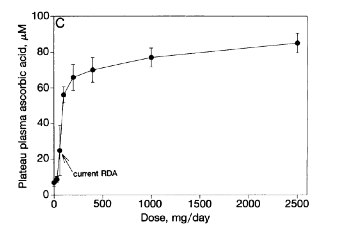Does Vitamin C Make You Urinate More
Were you looking for...
 Can Vitamin C Kill Flu?
Can Vitamin C Kill Flu?
Worried about flu this winter? Read about the power of high dose vitamin C against any flu, including swine flu. Read More
He excreted just over 500mg. The presenter concluded that supplementing anything over the RDA of 60mg therefore has no health benefit. This is such bad science.
Why? Because many nutrients required by the body, except fuel such as glucose which is burned for energy, or protein, which is broken down into amino acids to build cells, are excreted above a basic threshold. So, if you measure how much water you take in in a day, and how much you excrete, it will be roughly the same. Or how much calcium you eat and how much you excrete. But this doesn't mean you don't need it. All this proves is that the nutrient is well absorbed. (Nothing is excreted in urine if it isn't absorbed into the blood, which circulates nutrients to cells.)
The BBC experiment is a classic example of bad science, firstly, because we don't know how much the doctor consumed, and secondly, because of its wrong assumption that excreting something means it has no benefit on the way through. Taking the first point, let's take a guess that the doctor consumed 100mg – the average intake. If a person ate 100mg and supplemented 450mg, that's a total of 550mg. They would be expected to excrete pretty much the same amount, less about 50mg. Why?
At very low doses, below 100mg, the blood plasma levels are roughly less than 40microM/L. Below this level vit C is reabsorbed by the kidney to prevent scurvy and the oxidized to dehydroascorbate, then reduced back to ascorbate (also to prevent scurvy). The body is therefore using energy to retain a basic vitamin C and recycling it to prevent you from becoming sick. That's why you don't get scurvy immediately. The body recycles this much.
 At higher doses, with more vitamin C than needed just to prevent scurvy, each molecule of ascorbic acid can deliver 2 antioxidant electrons to the body, creating dehydroascorbate. Ascorbate + dehydroascorbate is excreted in the urine. The difference between the ascorbate absorbed and that excreted (not as dehydroascrobate) is the antioxidant potential added to the body. If the BBC experiment was serious about science it would have measured how much of the vitamin C was excreted as ascorbate and how much as dehydroascorbate, as well as knowing total intake from diet and supplements.
At higher doses, with more vitamin C than needed just to prevent scurvy, each molecule of ascorbic acid can deliver 2 antioxidant electrons to the body, creating dehydroascorbate. Ascorbate + dehydroascorbate is excreted in the urine. The difference between the ascorbate absorbed and that excreted (not as dehydroascrobate) is the antioxidant potential added to the body. If the BBC experiment was serious about science it would have measured how much of the vitamin C was excreted as ascorbate and how much as dehydroascorbate, as well as knowing total intake from diet and supplements.
The excretion of high doses is thus part of the mechanism of benefit. The body does not need to use energy trying to generate antioxidant electrons as it gets them for free from the high dose supplement.
Also, supplementing up to at least 2.5 grams for most people on most days more than doubles blood plasma levels compared to 'RDA' levels, even though the excess is finally excreted. You can see this in the graph below, taken from a research study by Mark Levine in the Proceedings of the National Academy of Sciences. If you supplement 2,000mg a day, which is what I do, you can expect your circulating plasma level to be three times higher than someone who just gets the RDA level. This is a big advantage because it is much harder for viruses and certain pathogenic bacteria, to survive at these concentrations.
The third advantage of higher dose vitamin C is that it is excreted in the urine. This protects the bladder and urinary tract.
But isn't it dangerous? There used to be a concern that taking too much would raise oxalic acid, thus stressing the kidneys and causing kidney stones. Early experiments had reported raised oxalic acid levels, but this was discovered to be due a faulty study design. The apparently higher levels of oxalic acid in the urine that have been previously reported arise from the fact that ascorbic acid, which is excreted in the urine, undergoes a chemical conversion to oxalic acid while it is in a test-tube prior to analysis.
This was proven several years ago by research at the Kidney Stone Research Laboratory of the University of Cape Town where they conducted a controlled trial in which 10 volunteer subjects were required to ingest 4g of Vit C per day for 5 days. Urines (24h) were collected before, during and after the ingestion period. Unlike the earlier studies they simply put a preservative in our urine collection bottles to prevent this conversion in the test tube. Previous studies failed to take this precaution and hence reported erroneously high oxalic acid levels in their urine.
These were rigorously analysed for a host of independent physicochemical risk factors, all of which are regarded as powerful indicators of the risk of kidney stone formation. The results showed that these risk factors were not significantly altered.
They concluded that ingestion of large doses of Vitamin C does not increase the risk of forming kidney stones. The results of this study. were published internationally.
I asked Professor Allen Rodgers from the University of Cape Town, one of the world's leading experts on kidney stones, if vitamin C could cause kidney stones and he said "The answer is simply no." On the basis of this research the official position of the Food Standards Agency in the UK is that vitamin C doesn't increase kidney stone risk.
So, there are no risks but are there benefits? The answer is lots. High intakes of vitamin C, meaning 1 gram or more, has consistently been shown to lower blood pressure, cholesterol, glucose, reduce length and severity of infections, risk for diabetes, heart disease and cancer.
Very high mega-doses have also been shown to be effective chemotherapy and amazing for recovery from virtually every known viral infection and others besides. Very high doses (I take 1 gram an hour if I get a cold) are for short-term use only.
So. Does taking vitamin C make expensive urine? Yes (not that expensive actually). Is it worth it? Yes.
Does Vitamin C Make You Urinate More
Source: https://www.patrickholford.com/blog/the-vitamin-c-pee-myth

0 Komentar